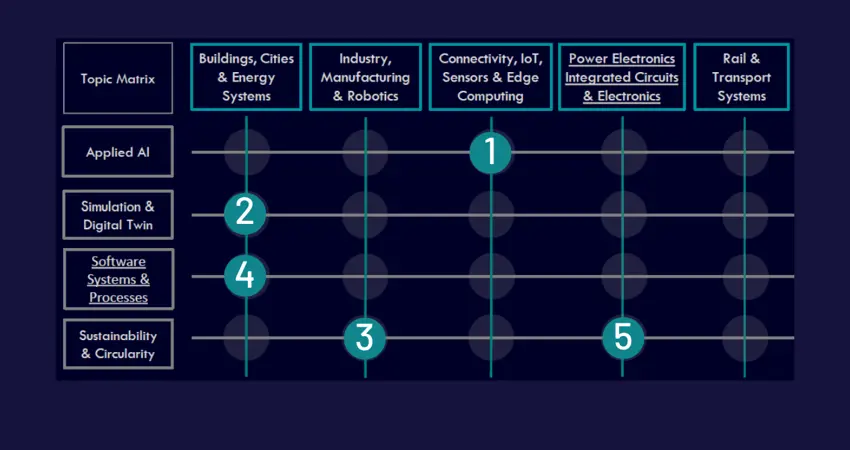27 Oct 2025
Oxford Engineers part of five projects in Oxford–TU Berlin–Siemens Seed Fund fourth round
Seed Funding aims to stimulate innovative joint research bids and build long-term partnerships

Schematic view of interdisciplinary research areas
Building on the success of previous collaborations, Siemens AG (SAG) University Relations, the University of Oxford Impact Acceleration Account Team, and TU Berlin’s Siemens Centre of Knowledge Interchange have announced the launch of the fourth Trilateral Seed Fund call, designed to stimulate innovative joint research bids.
The Seed Fund supports projects at the intersection of cutting-edge horizontal methods and technologies (Applied AI, Simulation & Digital Twin, Sustainability & Circularity, Software Systems & Processes) with key vertical application areas (Buildings & Energy Systems, Industry & Manufacturing, Connectivity & IoT, Power Electronics & Electronics, and Mobility & Transport Systems).
Engineering academics, Professors Noa Zilberman, Lucia Corsini, and Thomas Morstyn, are involved in the projects selected in 2025.
As with previous rounds, the initiative aims to catalyse long-term partnerships that enable strong project teams, build trust, and transform research ideas into impactful real-world solutions.
Five projects have been selected in 2025:
1) GeCo: The project involves Stefan Schmid and Arash Pourdamghani; Noa Zilberman and Peng Qian; and Andreas Blenk.
Developing scalable, robust and sustainable generative communication networks for optimised AI deployment across industrial applications through advanced algorithms, programmable networks, and carbon-aware infrastructure.
Prof Noa Zilberman said: "Unlocking the true potential of generative AI in industry requires reimagining network infrastructure. I am excited to tackle this challenge together with my colleagues at Siemens and TU Berlin, pioneering a new sustainable paradigm for industrial networks.”
2) LDES: Dr Joachim Müller-Kirchenbauer, Maike Kalz, Ferdinand Rädler and Tim Mielich; Thomas Morstyn; Stefan Niessen, Hans Jörg Heger and Dieter Most are part of the project.
This project focuses on advancing energy storage integration across Europe through multimodal energy system modelling, enhancing renewable energy reliability and industrial decarbonisation.
Prof Thomas Morstyn said, “Close collaboration between the UK and Europe on cross-border power flows and long duration energy storage is becoming increasingly important as we reach higher levels of renewable generation. The seed fund project has been a great opportunity to kick-start work in this area with experts from TU Berlin and Siemens.”
3) Re-Man: Jörg Krüger and Erik Sörqvist; Lucia Corsini and Priya Saikumar; Caroline Cassignol
Applying digital technologies like AI, robotics and IoT to accelerate and scale-up remanufacturing in order to reduce resource consumption and carbon emissions, and strengthen industrial resilience. This collaboration will also help shape future skills, standards, and technologies for greener manufacturing across Europe.
Prof Corsini said: ‘‘We are delighted to have this opportunity to work with Siemens and TU Berlin, leveraging new research and technologies to tackle real-world industry challenges while advancing Europe’s circular economy and critical raw materials efforts.’’
4) ORCHESTRA: This project includes Axel Küpper & Dr Vera Schmitt; Ani Calinescu; Johanna Bronner.
Creating trustworthy Agentic AI workflows to enhance automation and human-machine collaboration, ensuring robust, explainable, and secure interactions across industries
5) Re-Electronics: (Nora Jeske, Lucia Corsini, Priya Saikumar, Susanne-Vera Rotter) has joined as the fifth partner team in the Trilateral Seed Funding initiative.
This collaboration will focus on scalable, energy-efficient, circular economy solutions for industrial electronics, which include advanced recycling, remanufacturing, and repair strategies to enhance resource efficiency. The project will explore new ways to repair, reuse, and recycle complex components like circuit boards and power electronics so that valuable materials don’t go to waste.




